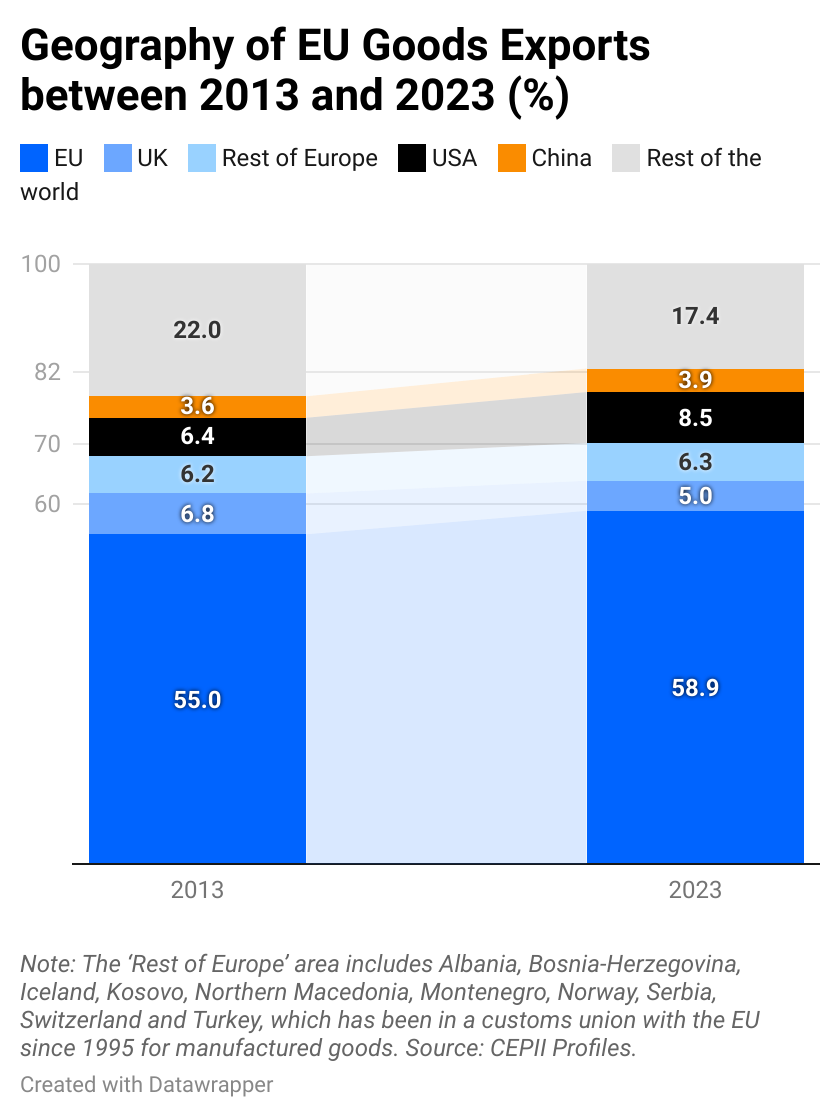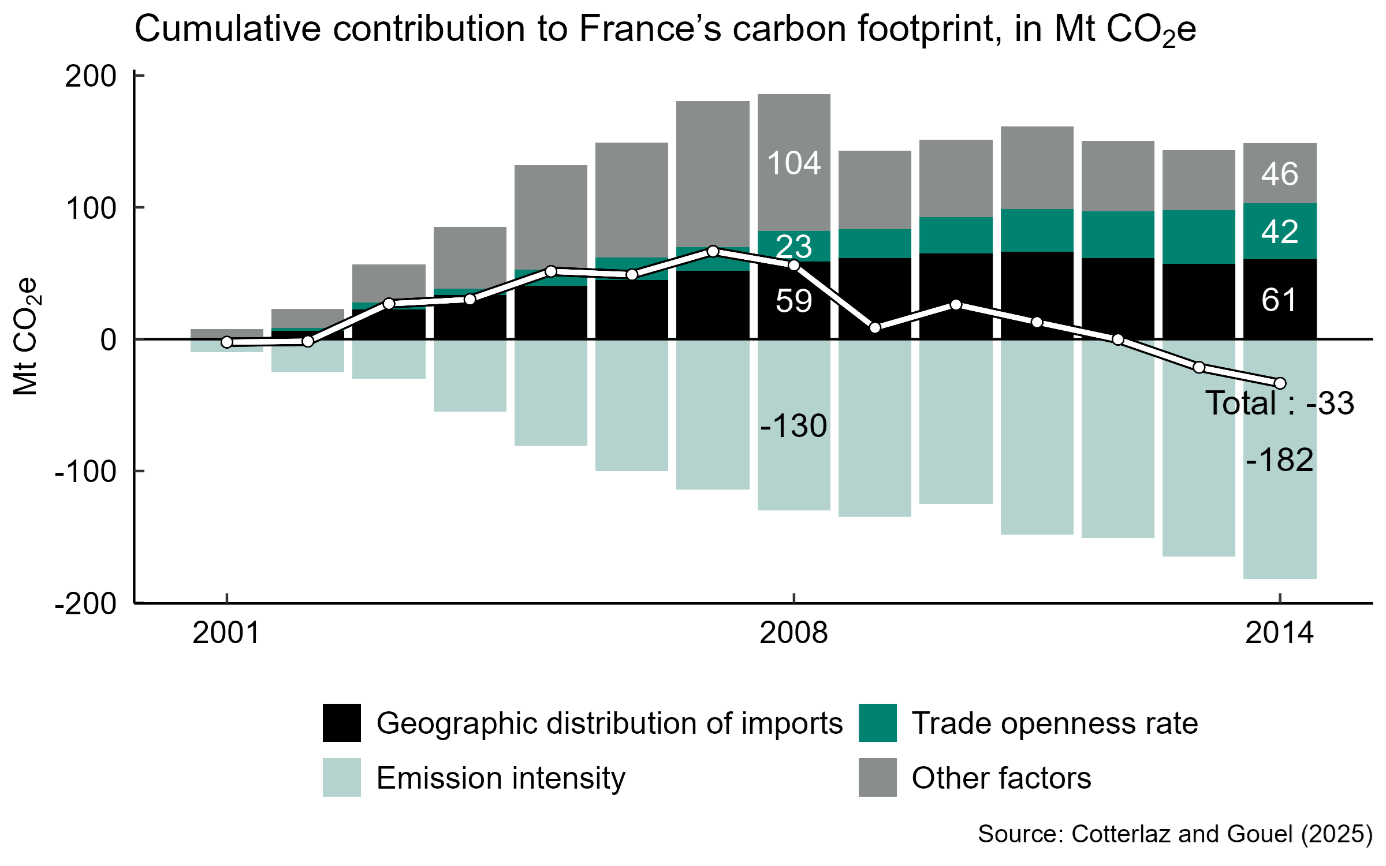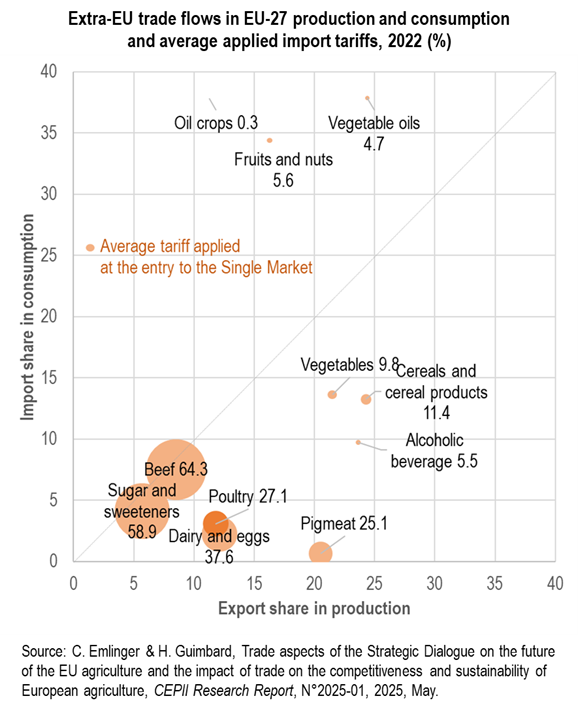The aim of this Policy Brief is to define the threat of trade retaliation that would tip the balance of power in favor of the European Union in response to the protectionist agenda of the new US administration, while limiting the focus to trade in goods in order to avoid extending the trade war to services. First, authors estimate the export losses incurred by European exporters in a simple scenario of US protectionism: plus 10 percentage points (pp) on US duties on all European products. They calculate the uniform European customs duty on a list of products that would impose a commensurable loss of exports on American exporters. As the European Union’s strategy is constrained by the interdependence between the economies on both sides of the Atlantic, the Brief first draws up a “negative” list, taking account of trade dependency on imports: Imposing tariffs on these 412 products could call into question the resilience of European value chains. Of the remaining products, the authors identify 1,064 product groups for which the European Union accounts for at least 20% of US exports. To inflict on the United States market losses equivalent to those suffered by European exporters would require the application of an additional customs duty of 40 pp to the American products on this “positive” list – which would likely lead to a spiral of trade conflict, and be costly for both parties. Antoine Bouët, Lionel Fontagné, Houssein Guimbard, Pauline Wibaux, Yu Zheng
>>> |
This Working Paper investigates how multinational enterprises (MNEs) adapted their global operations in the post COVID-19 period. Using the pandemic as a natural experiment, the authors analyze how MNEs adjusted employment across their foreign and domestic affiliates in response to economic disruptions and shifting perceptions. Constance Marette, Camilo Umana Dajud, Vincent Vicard
>>> |
The Covid-19 crisis heightened awareness of the vulnerabilities inherent in global trade, prompting a re-evaluation of the benefits and risks of globalization. Although global trade openness briefly declined – reflecting a sharper drop in trade than in GDP during lockdowns – it quickly rebounded to pre-crisis levels. However, this aggregate trend may conceal significant microeconomic shifts in firm behavior. In particular, the employment responses of multinational enterprises (MNEs), which play a central role in global value chains, offer valuable insights into the reshaping of the global trading system. Post-crisis, MNEs exhibited stronger employment resilience than purely domestic firms, especially within their home-country affiliates. This home bias in MNE responses may signal the early stages of a reshoring trend. Constance Marette, Camilo Umana Dajud, Vincent Vicard
>>> |
- What Strategy Should the European Union Adopt in the Face of US Protectionism?
Antoine Bouët, Lionel Fontagné, Houssein Guimbard, Pauline Wibaux, Yu Zheng
- The impact of international trade on France's carbon footprint
Pierre Cotterlaz, Christophe Gouel - European agri-food: sectoral contrasts in the face of trade liberalization
Charlotte Emlinger, Houssein Guimbard - Transatlantic Tariff Agreement: Toward a Further Intensification of Intra-European Trade?
Deniz Ünal - Transatlantic Tariff Negotiation: "Positive versus Negative" List Strategy for the European Union
Antoine Bouët, Lionel Fontagné, Houssein Guimbard, Pauline Wibaux, Yu Zheng
- Multinationals Here and There: Affiliates' Response to Global Crises
Constance Marette, Camilo Umana Dajud, Vincent Vicard - Outsourcing Decarbonization? How Trade Shaped France’s Carbon Footprint (2000–14)
Pierre Cotterlaz, Christophe Gouel - The Variance of Gravity
Camilo Umana Dajud - Deep Trade Agreements and Heterogeneous Firms’ Exports
Matteo Neri-Lainé, Gianluca Orefice, Michele Ruta
- Multinational Enterprises Since Covid: Stronger Than Domestic Firms, Especially at Home
Constance Marette, Camilo Umana Dajud, Vincent Vicard
Sovereign Default and IMF Stabilization: Lessons from Sri Lanka
November 5, 2025
15th Annual International Conference on Immigration in OECD Countries
December 11 - 12, 2025
Presentation of the CEPII's annual publication "L'économie mondiale 2026"
Video available online
Transatlantic Tariff Agreement: Toward a Further Intensification of Intra-European Trade? American protectionism constitutes an additional shock likely to reinforce trade within the Single Market. Deniz Ünal >>> |
The impact of international trade on France's carbon footprint The geographical origin of France's imports played a decisive role in the increase of its carbon footprint during the 2000s. This trend is primarily explained by the "China shock" followed by the rise in the economy's openness rate. Pierre Cotterlaz, Christophe Gouel >>> |
European agri-food: sectoral contrasts in the face of trade liberalization In discussions surrounding international trade agreements, European agriculture is often portrayed as a homogeneous sector, unable to compete on the global stage. This oversimplified perception fuels ongoing debates over market liberalization, foreign competition, and the safeguarding of domestic industries. Charlotte Emlinger, Houssein Guimbard >>> |
Deadline for application :
October 1, 2025
Deadline for application :
October 10, 2025
- Contact us
- Our other sites
 |
ISSN: 1255-7072
Editorial Director : Antoine BouëtManaging Editor : Evgenia Korotkova















